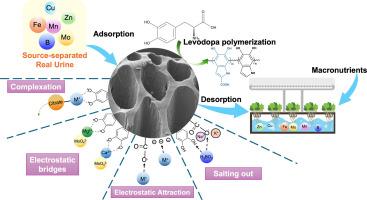Selective recovery of trace elements from urine
IF 10.9
1区 环境科学与生态学
Q1 ENGINEERING, ENVIRONMENTAL
引用次数: 0
Abstract
Source-separated urine presents an exciting opportunity to reduce dependence on synthetic fertilizers and support circular nutrient recovery. While various techniques have been proposed to recover nitrogen and phosphate from urine, trace element recovery remains underexplored. This study proposes a novel strategy for selectively recovering trace elements from source-separated urine using biocompatible and low-cost materials, l-DOPA modified biochar (M-BC), aimed at sustainable hydroponic trace nutrients supply. The M-BC achieved adsorption efficiencies of 100 %, 64.6 %, 50.1 %, 31.1 %, 15.7 %, and 6.4 % for Cu, Zn, Mo, Fe, Mn, and B, primarily through complexation. The hydrophilicity and electrostatic repulsion properties of M-BC surface prevented undesirable pharmaceutical adsorption. Sequential desorption using EDTA followed by HNO3 effectively enhanced multi-element recovery. Hydroponic trials showed that lettuce grown with the recycled trace element solutions achieved comparable growth to those using standard Hoagland nutrient solutions. This study confirms the feasibility of selectively recovering trace elements for hydroponic agriculture.

选择性地从尿液中回收微量元素
源分离尿液提供了一个令人兴奋的机会,以减少对合成肥料的依赖,并支持循环养分回收。虽然已经提出了从尿液中回收氮和磷酸盐的各种技术,但微量元素的回收仍未得到充分的探索。本研究提出了一种利用生物相容性和低成本材料——l-DOPA修饰生物炭(M-BC)选择性回收源分离尿液中微量元素的新策略,旨在实现可持续的水培微量营养素供应。M-BC对Cu、Zn、Mo、Fe、Mn和B的吸附效率分别为100%、64.6%、50.1%、31.1%、15.7%和6.4%。M-BC表面的亲水性和静电斥力防止了不良的药物吸附。EDTA连续解吸后HNO3有效提高了多元素回收率。水培试验表明,用回收的微量元素溶液种植的生菜与使用标准霍格兰营养液的生菜的生长效果相当。本研究证实了水培农业选择性回收微量元素的可行性。
本文章由计算机程序翻译,如有差异,请以英文原文为准。
求助全文
约1分钟内获得全文
求助全文
来源期刊

Resources Conservation and Recycling
环境科学-工程:环境
CiteScore
22.90
自引率
6.10%
发文量
625
审稿时长
23 days
期刊介绍:
The journal Resources, Conservation & Recycling welcomes contributions from research, which consider sustainable management and conservation of resources. The journal prioritizes understanding the transformation processes crucial for transitioning toward more sustainable production and consumption systems. It highlights technological, economic, institutional, and policy aspects related to specific resource management practices such as conservation, recycling, and resource substitution, as well as broader strategies like improving resource productivity and restructuring production and consumption patterns.
Contributions may address regional, national, or international scales and can range from individual resources or technologies to entire sectors or systems. Authors are encouraged to explore scientific and methodological issues alongside practical, environmental, and economic implications. However, manuscripts focusing solely on laboratory experiments without discussing their broader implications will not be considered for publication in the journal.
 求助内容:
求助内容: 应助结果提醒方式:
应助结果提醒方式:


